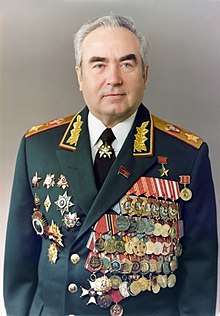Viktor Kulikov
Viktor Georgiyevich Kulikov (Russian: Виктор Георгиевич Куликов; 5 July 1921 – 28 May 2013) was the Warsaw Pact commander-in-chief from 1977 to 1989. He was awarded the rank of the Marshal of the Soviet Union on 14 January 1977.
Viktor Kulikov | |
|---|---|
 | |
| Birth name | Виктор Георгиевич Куликов Viktor Georgiyevich Kulikov |
| Born | 5 July 1921 Verkhnyaya Lyubovsha village, Oryol Oblast, Russian SFSR |
| Died | 28 May 2013 (aged 91) Moscow, Russia |
| Allegiance | |
| Years of service | 1940–1989 |
| Rank | Marshal of the Soviet Union (1977-1989) |
| Battles/wars | World War II |
| Awards | Hero of the Soviet Union |
Kulikov was born into a peasant family and joined the Red Army in 1940. He saw service in World War II and was made a Hero of the Soviet Union.
Kulikov commanded the Kiev Military District in 1967–1969 and the Group of Soviet Forces in Germany in 1969–1971. From 1971 until 1977, he served as the Chief of General Staff of the Soviet Armed Forces. In 1983, he was awarded a Lenin Prize. Kulikov was a member of the Soviet/Russian parliament 1989–2003. He was awarded the highest Cuban award, the Order of Playa Girón in 2006.[1]
Kulikov died after an extended illness in 2013.[2]
Honours and awards
- USSR and Russia
- Hero of the Soviet Union (3 July 1981)
- Order of Merit for the Fatherland;
- 2nd class II degrees (10 July 2001) - for outstanding contribution to strengthening national defence and an active law-making
- 3rd class (3 July 1996) - for services to the state and personal contribution to the development and reform of the Armed Forces of the Russian Federation
- 4th class (23 June 2011) - a contribution to strengthening national defence and long-term public activities
- Order of Military Merit
- Order of Honour (5 July 2006) - for services to strengthen national defence and a lot of work on patriotic education of young people
- Four Orders of Lenin (2 July 1971, 21 February 1978, 3 July 1981 and 19 February 1988)
- Order of the Red Banner, three times (26 October 1943, 20 July 1944 and 22 February 1968)
- Order of the Patriotic War, 1st class, three times (7 September 1943, 12 May 1945 and 6 April 1985)
- Order of the Red Star (26 October 1955)
- Order for Service to the Homeland in the Armed Forces of the USSR, 3rd class (30 April 1975)
- Medal For Courage
- Medal for Combat Service
- Lenin Prize (1983)
- An individual weapon - a gun (on retirement in 1992)
- Foreign awards
- Order of Sukhbaatar (Mongolia, 1981)
- Patriotic Order of Merit, 1st class (GDR, 1981)
- Star of People's Friendship, 1st class (GDR, 1985)
- Scharnhorst Order, three times (GDR, 1972, 1986, 1987)
- Order "For Service to the Motherland and the people", 1st class (GDR, 1970)
- Order of Georgi Dimitrov (Bulgaria, 1984)
- Order "The People's Republic of Bulgaria", 1st class (1974)
- Commander's Cross with Star of the Order of Polonia Restituta (Poland, 1973)
- Order Banner IRR with diamonds (Hungary, 1975)
- Order of the Red Star (Hungary, 1985)
- Order "For Military Valour", 1st class (NRW, 1983)
- Order of the Victorious February (Czechoslovakia, 1985)
- Order "For Military Merit", 1st class (Peru, 1972)
- Order "On 23 August", 1st class (CPP, 1974)
References
- "Archived copy". Archived from the original on January 3, 2007. Retrieved December 31, 2006.CS1 maint: archived copy as title (link)
- Скончался маршал Советского Союза Виктор Куликов (in Russian). RIA Novosti. Retrieved 28 May 2013.
External links
| Military offices | ||
|---|---|---|
| Preceded by Matvei Zakharov |
Chief of the General Staff of the Armed Forces of the Soviet Union September 1971 – 7 January 1977 |
Succeeded by Nikolai Ogarkov |
| Preceded by Ivan Yakubovsky |
Supreme Commander of the Unified Armed Forces of the Warsaw Treaty Organization 1977–1989 |
Succeeded by Petr Lushev |